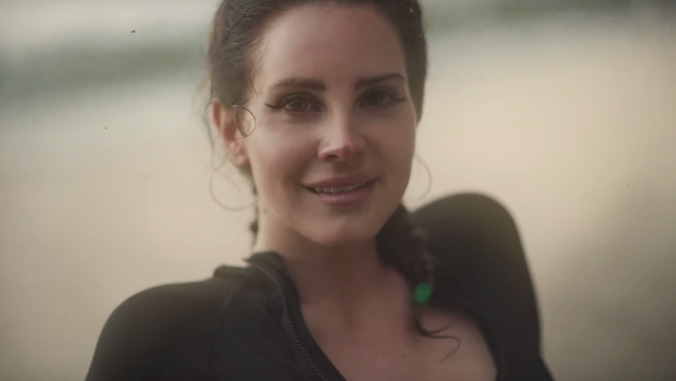Lana Del Rey goes confessional on the meandering Norman Fucking Rockwell

The title of Lana Del Rey’s sixth album, Norman Fucking Rockwell, is meant to be provocative. Is it sarcastic commentary on the illusion of an American utopia? A pointed dig on how modern society is anything but idyllic? Del Rey herself declaring that she’s an arbiter of a new kind of exceptionalism? As it turns out, in an interview with Vanity Fair, she shares that her interpretation is exasperation paired with a slight eye roll. “‘It was kind of an exclamation mark: So this is the American dream, right now,’ she says. ‘This is where we’re at—Norman fucking Rockwell. We’re going to go to Mars, and [Donald] Trump is president, all right.’”
Del Rey later went on to deny that the title is meant to be “cynical,” which is often hard to believe, as Norman Fucking Rockwell is rather lukewarm on the modern world and its denizens. “Why wait for the best when I could have you?” she sings sarcastically on the title track, an evisceration of a frustrating “man-child” who thinks he’s more of a brilliant poet than he actually is. “The Greatest,” meanwhile, mourns for a wild and debauched past amidst a big comedown and a decidedly non-glamorous reality: “Hawaii just missed that fireball / L.A. is in flames‚ it’s getting hot / Kanye West is blonde and gone / ‘Life On Mars’ ain’t just a song.” Other tunes, including “Happiness Is A Butterfly” and “Fuck It I Love You,” detail romances torpedoed (and tormented) by egos and indifference.
Yet Del Rey’s narrators on Norman Fucking Rockwell are more willing now than ever to let their guard down and be real, perhaps because they’ve realized that maintaining a blasé, cool-girl façade is exhausting. On “Mariners Apartment Complex,” the protagonist declares, “I ain’t no candle in the wind,” after her partner mistakenly bonds with her over sadness, while the swagger of “Venice Bitch” is tempered with hard-won wisdom: “I moved to California‚ but it’s just a state of mind / It turns out everywhere you go‚ you take yourself‚ that’s not a lie.” On “Bartender,” the narrator stresses she balances partying with depth: “Sometimes, girls just want to have fun / The poetry inside of me is warm like a gun.” And the album ends with the stunningly personal “Hope Is A Dangerous Thing For A Woman Like Me To Have – But I Have It,” a sparse piano ballad that addresses grief, disappointment, and regret with piercing clarity.
The latter song, which musically conjures both the cadences of Leonard Cohen’s “Famous Blue Raincoat” and Cat Power’s most intimate moments, also embodies Norman Fucking Rockwell’s focused musical direction. Del Rey’s Instagram filter-tinted malaise is her calling card, but on this album she jettisons any sonic sluggishness in favor of crisp, unadorned instrumentation: wistful piano, light horns and string accents, sighing guitar. If anything, Norman Fucking Rockwell is her version of a confessional singer-songwriter record, the kind of LP artists make after they’ve established their career is on solid ground.
However, it’s also likely no accident that this new batch of songs reveals a lyrical fascination with the Laurel Canyon rock scene of the ’70s; in separate songs, Del Rey references bands such as the Eagles and Crosby, Stills & Nash, as well as the California area itself. The free-spirited, romanticized vibe of that era and its denizens hovers over Norman Fucking Rockwell’s woozy ballads and gentle folk haze. (Not for nothing did Del Rey describe her album to Billboard as “a folk record with a little surf twist.”) Del Rey even stretches and twists her voice into new vistas—reaching into her high, decadent-shriek range on “Fuck It I Love You,” and taking a conspiratorial tone elsewhere, as on the dimly lit “How To Disappear.” (One notable exception to this grounded vibe is her laissez-faire cover of Sublime’s “Doin’ Time,” a note-perfect update that conjures heat shimmers off hot asphalt.)
Intriguingly enough, Del Rey’s main songwriter and producer foil this time around is Jack Antonoff, who’s known for a heavy-handed pop approach. Wisely, he doesn’t make a dent in her sound; instead, Antonoff gets out of Del Rey’s way and encourages her meandering and confessional vibe. (Going by the same Billboard interview, in fact, their working relationship bloomed after Antonoff played Del Rey “10 minutes of weird, atmospheric riffs.”) The pair’s creative apex is “Venice Bitch,” a nearly 10-minute song featuring haywire sound effects that resemble a psychedelic prog freak-out. It’s a detour that could become completely self-indulgent—but manages to work like some nightmarish dream.
Norman Fucking Rockwell doesn’t always connect. It’s one of Del Rey’s sleepiest albums yet, which is saying something, and the music could be trimmed and tightened here and there. And, at times, her references to other pop culture and musical moments can feel too much like a lazy creative crutch (although the couplet “I miss the bar where the Beach Boys would go / Dennis’ last stop before Kokomo” is gold). But as a mood piece, Norman Fucking Rockwell does an admirable job preserving Del Rey’s mystique while moving her sound forward. And, if you listen closely, there’s even optimism peeking through, particularly on “Venice Bitch”: “Give me Hallmark / One dream, one life, one lover / Paint me happy in blue / Norman Rockwell / No hype under our covers / It’s just me and you.”